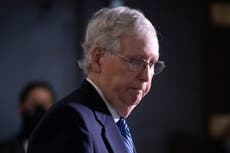'Obama was asking for an unusual favor': McConnell defends voting on Supreme Court nomination despite blocking Obama's 2016 nominee
‘The American people should have a voice in the selection of their next Supreme Court justice,’ McConnell argued in February 2016, more than seven months out from that year’s election
Senate Majority Leader Mitch McConnell took to the Senate floor on Monday to explain why he’ll hold a vote on Donald Trump’s pending nomination to fill the Supreme Court vacancy left by the late Justice Ruth Bader Ginsburg, even though he opposed voting on Barack Obama’s nomination to the court in similar circumstances in 2016.
Mr McConnell differentiated Mr Obama’s 2016 selection of DC Circuit Court Judge Merrick Garland to replace Justice Antonin Scalia from Mr Trump’s 2020 pick by saying there was “divided government” in 2016, whereas Republicans control both the Senate and the White House now.
Mr Obama was asking for "an unusual favor" for an opposite party-controlled Senate to confirm his Supreme Court pick in an election year, Mr McConnell said on Monday.
The Kentucky Republican, who is also up for re-election this November, vowed to hold a vote on Mr Trump’s nomination before the end of the year.
“President Trump's nominee for the vacancy will receive a vote on the floor of the Senate,” he said.
"The Senate has more than sufficient time to process the nomination" before the 3 November elections, Mr McConnell said, although he did not commit to holding a vote before then.
The Senate could also vote on Mr Trump’s nominee in the lame-duck session after the election.
Mr McConnell and other Senate Republicans frequently cited comments from 1992 from then-Democratic Senator Joe Biden of Delaware arguing that election years were no time for filling Supreme Court vacancies.
“Once the political season is under way … action on a Supreme Court nomination must be put off until after the election campaign is over,” Mr Biden said at the time, a remark that Republicans in 2016 came to call the “Biden rule.”
There was no vacancy at the time Mr Biden, who is now the Democratic presidential nominee for 2020, delivered those remarks.
After eulogising Justice Ginsburg’s progressive legacy, Senate Minority Leader Chuck Schumer harangued Mr McConnell for the Senate GOP’s hypocrisy moving forward with a vote on Mr Trump’s imminent Supreme Court nomination.
The New York Democrat highlighted news reports that it was Justice Ginsburg’s “dying wish, most fervent wish” that president and Senate wait to fill her seat until after the new Congress — and potentially a new president — is seated next January.
“The Senate Republican majority should have no problem adhering to Justice Ginsburg's dying wish. Leader McConnell held the seat Supreme Court vacancy open for nearly a year in order to, quote, ‘give the people a voice in selecting a Supreme Court justice,’” Mr Schumer said, referencing Mr McConnell’s own words about waiting for a mandate on which party should fill the Supreme Court vacancy left by Mr Scalia in 2016.
Justice Ginsburg’s body will lie in repose at the US Supreme Court building on Wednesday and Thursday following her death on 18 September after a prolonged battle with pancreatic cancer. Justice Ginsburg's body will also lie in state in National Statuary Hall at the US Capitol on Friday.
A private interment at Arlington National Cemetery is scheduled for next week.
Black drapes are hanging above the court doors to mark the court's mourning, a tradition in place since 1873.
Justice Ginsburg took her judicial oath as an associate justice at the Supreme Court in 1993, following her nomination to the court by then-president Bill Clinton. She was the second woman, after Sandra Day O'Connor, and among only four women to serve as a justice on the high court.
She was first diagnosed with colon cancer in 1999 and survived several bouts with cancer over the decades that followed. She began receiving another round of cancer treatments in May 2020. She died on Friday at age 87.
Alex Woodward contributed to this report.
Join our commenting forum
Join thought-provoking conversations, follow other Independent readers and see their replies
Comments




Bookmark popover
Removed from bookmarks